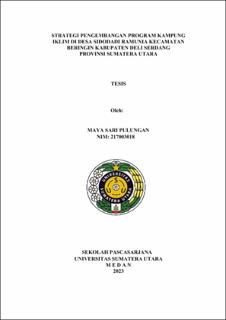Strategi Pengembangan Program Kampung Iklim di Desa Sidodadi Ramunia Kecamatan Beringin Kabupaten Deli Serdang Provinsi Sumatera Utara
Strategy of Developing Weather Village Program at Sidodadi Ramunia Village, Beringin Sub-District, Deli Serdang Regency, North Sumatera Province

Date
2023Author
Pulungan, Maya Sari
Advisor(s)
Hadinugroho, Dwi Lindarto
Slamet, Bejo
Metadata
Show full item recordAbstract
The Climate Village Program is a national program with a target of establishing
20,000 climate villages spread throughout Indonesia to control climate change in
Indonesia. Implementing the climate village program still requires strategies to
increase adaptation capacity, mitigation activities, institutional strengthening, and
the number of climate villages. This research aims to analyze Proklim
development strategies and priority strategies for Proklim development in
Sidodadi Ramunia Village, Beringin District, Deli Serdang Regency, North
Sumatra Province. The method used is qualitative with a survey approach and
SWOT and AHP analysis. This research began by identifying adaptation and
mitigation actions that residents in Sidodadi Ramunia Village had carried out.
Then, a Forum Group Discussion (FGD) was carried out, which resulted in 3
activity targets to be developed, namely (1) Increasing the use of organic
fertilizer, (2) creating a waste bank, and (3) developing other locations to be
proposed as climate villages. Based on the results of the SWOT analysis, the
appropriate strategy in realizing the first activity target is training and assistance
in making quality organic fertilizer and providing education on the use of
fertilizer; the priority target of the second activity is finding a place to store waste
that has been sorted and establishing collaboration with the Main Waste Bank, and
The third target priority strategy is to provide education to village officials
regarding the climate village program. The results of the AHP analysis show that
the strategic priority in developing climate villages is increasing the use of organic
fertilizer with a weight value of 0.402 and an inconsistency value of 0.05. This
research shows that training and direct assistance in making quality organic
fertilizer is needed to increase the use of organic fertilizer, which can ultimately
trigger the community to sort organic and inorganic waste.
